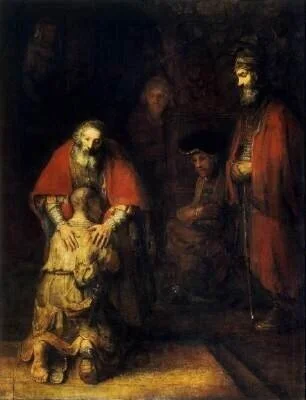¡Desconecta con la aplicación Player FM !
Through a Different Lens
Manage episode 292117556 series 2415811

The Prodigal Son, Rembrandt van Rijn, c. 1669, The Hermitage Museum, St Petersburg, Russia
I’ve enjoyed photography ever since I received my first Kodak camera when I was ten years old. Photos hold memories of travels and people and the experiences we’ve shared. They also have allowed me to dwell in God’s creation like birds at the zoo, or a mountain range at dawn, when a moment is captured forever.
As we begin venturing out from the pandemic, I’m taking my digital camera along with me and I’m often amazed when I look at the images later that they aren’t exactly the way I remember them.
My eyes and mind often distort an image, making me “see” it the way I want. I marvel at a beautiful rose only to find that when I later look at its image, I see that one petal is malformed, maybe caught in too much sunshine or too much rain.
What photography is showing me is that things look differently depending upon the lens you are looking through. My wide angle lens captures more in the image, but it distorts the view where closer objects appear bigger than those farther away, even when they are the same size.
My telephoto lens zooms in on the bird in the zoo, revealing details that I can’t see from behind the railing.
The perspective that we get from different viewpoints applies in relationships, too. In Luke 15:11-32, we hear the Parable of the Lost Son. We learn through dialogue that the wayward son’s return is perceived very differently by the father and the older brother. Rembrandt has introduced onlookers into his painting of the reunion. What do they think of this unusual scene? Do they think the father is crazy for taking back his wayward son who had squandered his portion of the inheritance, or do they see the compassion in the father’s eyes and understand the meaning of God’s mercy and grace?
I’d like to develop the insight of Rembrandt: to understand the different perspectives that people have when perceiving the same scene. Whether it is politics, social issues, or issues of faith, if I can put myself in your shoes, we’ll be able to have a better, more intimate conversation than if I only see from my own narrow perspective.
Blessings, my friend,
Agatha
96 episodios
Manage episode 292117556 series 2415811

The Prodigal Son, Rembrandt van Rijn, c. 1669, The Hermitage Museum, St Petersburg, Russia
I’ve enjoyed photography ever since I received my first Kodak camera when I was ten years old. Photos hold memories of travels and people and the experiences we’ve shared. They also have allowed me to dwell in God’s creation like birds at the zoo, or a mountain range at dawn, when a moment is captured forever.
As we begin venturing out from the pandemic, I’m taking my digital camera along with me and I’m often amazed when I look at the images later that they aren’t exactly the way I remember them.
My eyes and mind often distort an image, making me “see” it the way I want. I marvel at a beautiful rose only to find that when I later look at its image, I see that one petal is malformed, maybe caught in too much sunshine or too much rain.
What photography is showing me is that things look differently depending upon the lens you are looking through. My wide angle lens captures more in the image, but it distorts the view where closer objects appear bigger than those farther away, even when they are the same size.
My telephoto lens zooms in on the bird in the zoo, revealing details that I can’t see from behind the railing.
The perspective that we get from different viewpoints applies in relationships, too. In Luke 15:11-32, we hear the Parable of the Lost Son. We learn through dialogue that the wayward son’s return is perceived very differently by the father and the older brother. Rembrandt has introduced onlookers into his painting of the reunion. What do they think of this unusual scene? Do they think the father is crazy for taking back his wayward son who had squandered his portion of the inheritance, or do they see the compassion in the father’s eyes and understand the meaning of God’s mercy and grace?
I’d like to develop the insight of Rembrandt: to understand the different perspectives that people have when perceiving the same scene. Whether it is politics, social issues, or issues of faith, if I can put myself in your shoes, we’ll be able to have a better, more intimate conversation than if I only see from my own narrow perspective.
Blessings, my friend,
Agatha
96 episodios
Todos los episodios
×Bienvenido a Player FM!
Player FM está escaneando la web en busca de podcasts de alta calidad para que los disfrutes en este momento. Es la mejor aplicación de podcast y funciona en Android, iPhone y la web. Regístrate para sincronizar suscripciones a través de dispositivos.




